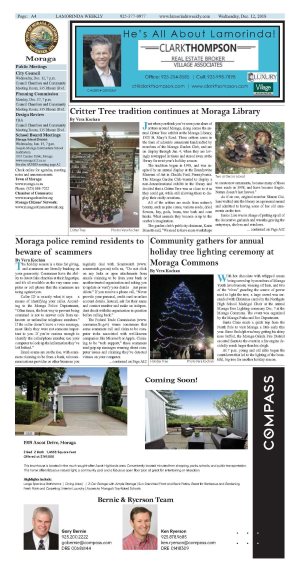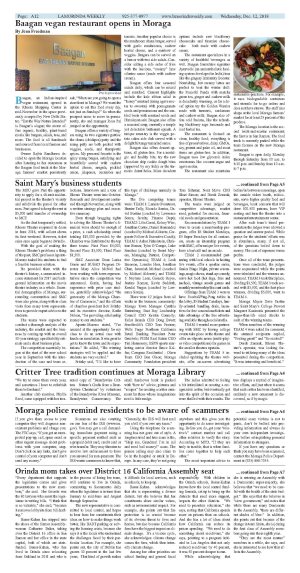| | Published December 12th, 2018
| Moraga police remind residents to beware of scammers
| | | By Vera Kochan | | |
The holiday season is a time for giving, and scammers are literally banking on your generosity. Consumers have the ability to detect fake charities at their fingertips, and it's all available on the very same computer or cell phone that the scammers are using against you.
 Caller ID is exactly what it says - a means of identifying your caller. According to the Moraga Police Deptartment, "Often times, the best way to prevent being scammed is not to answer calls from unknown or unfamiliar telephone numbers." If the caller doesn't leave a voice message, most likely they were not someone important to you. If you're curious enough to identify the caller/phone number, use your computer to look up the information they've left behind."
Caller ID is exactly what it says - a means of identifying your caller. According to the Moraga Police Deptartment, "Often times, the best way to prevent being scammed is not to answer calls from unknown or unfamiliar telephone numbers." If the caller doesn't leave a voice message, most likely they were not someone important to you. If you're curious enough to identify the caller/phone number, use your computer to look up the information they've left behind."
 Email scams are on the rise, with scammers claiming to be from a bank, telecommunications provider or other business you regularly deal with. Scamwatch (www.scamwatch.gov.au) tells us, "Do not click on any links or open attachments from emails claiming to be from your bank or another trusted organization and asking you to update or verify your details - just press delete." If you receive a phone call, "Never provide your personal, credit card or online account details. Instead, ask for their name and contact number and make an independent check with the organization in question before calling back."
Email scams are on the rise, with scammers claiming to be from a bank, telecommunications provider or other business you regularly deal with. Scamwatch (www.scamwatch.gov.au) tells us, "Do not click on any links or open attachments from emails claiming to be from your bank or another trusted organization and asking you to update or verify your details - just press delete." If you receive a phone call, "Never provide your personal, credit card or online account details. Instead, ask for their name and contact number and make an independent check with the organization in question before calling back."
 The Federal Trade Commission (www.consumer.ftc.gov) warns consumers that some scammers call and claim to be computer techs associated with well-known companies like Microsoft or Apple. Claiming to be "tech support," these scammers send pop-up messages warning about computer issues and claiming they've detected viruses on your computer. If you give them access to your computer they will diagnose nonexistent problems and charge you. The FTC says, "If you get an unexpected pop-up, call, spam email or other urgent message about problems with your computer, stop. Don't click on any links, don't give control of your computer and don't send any money."
The Federal Trade Commission (www.consumer.ftc.gov) warns consumers that some scammers call and claim to be computer techs associated with well-known companies like Microsoft or Apple. Claiming to be "tech support," these scammers send pop-up messages warning about computer issues and claiming they've detected viruses on your computer. If you give them access to your computer they will diagnose nonexistent problems and charge you. The FTC says, "If you get an unexpected pop-up, call, spam email or other urgent message about problems with your computer, stop. Don't click on any links, don't give control of your computer and don't send any money."
 Scammers are also counting on our fear of the IRS (www.irs.gov). You may get a call demanding immediate payment using a specific payment method such as a prepaid debit card, credit card or wire transfer. They may threaten to involve law enforcement to have you arrested for non-payment. The IRS wants consumers to know that, "Generally, the IRS will first mail you a bill if you owe any taxes."
Scammers are also counting on our fear of the IRS (www.irs.gov). You may get a call demanding immediate payment using a specific payment method such as a prepaid debit card, credit card or wire transfer. They may threaten to involve law enforcement to have you arrested for non-payment. The IRS wants consumers to know that, "Generally, the IRS will first mail you a bill if you owe any taxes."
 Using the telephone for scamming has not gone out of style. A longtime tried and true scam is the, "Help me, Grandma! I'm in jail and need bail money!" scam. The person calling may also claim to be in the hospital or stuck in Europe. In any case, they're not going anywhere and this gives you the opportunity to do some investigating. Before you do, get your "relative's" contact number and call other relatives to verify the story. According to MPD, "If they are truly in trouble, that is when families come together to help each other."
Using the telephone for scamming has not gone out of style. A longtime tried and true scam is the, "Help me, Grandma! I'm in jail and need bail money!" scam. The person calling may also claim to be in the hospital or stuck in Europe. In any case, they're not going anywhere and this gives you the opportunity to do some investigating. Before you do, get your "relative's" contact number and call other relatives to verify the story. According to MPD, "If they are truly in trouble, that is when families come together to help each other."
 The most important advice to potential scam victims is not to panic, don't be bullied into providing information and always do your own independent investigation before relinquishing personal information to strangers.
The most important advice to potential scam victims is not to panic, don't be bullied into providing information and always do your own independent investigation before relinquishing personal information to strangers.
 If you have any questions or think you may have been scammed, contact the Moraga Police Department at (925) 888-7055.
If you have any questions or think you may have been scammed, contact the Moraga Police Department at (925) 888-7055.


|
| | | | | | | | | | | | |



